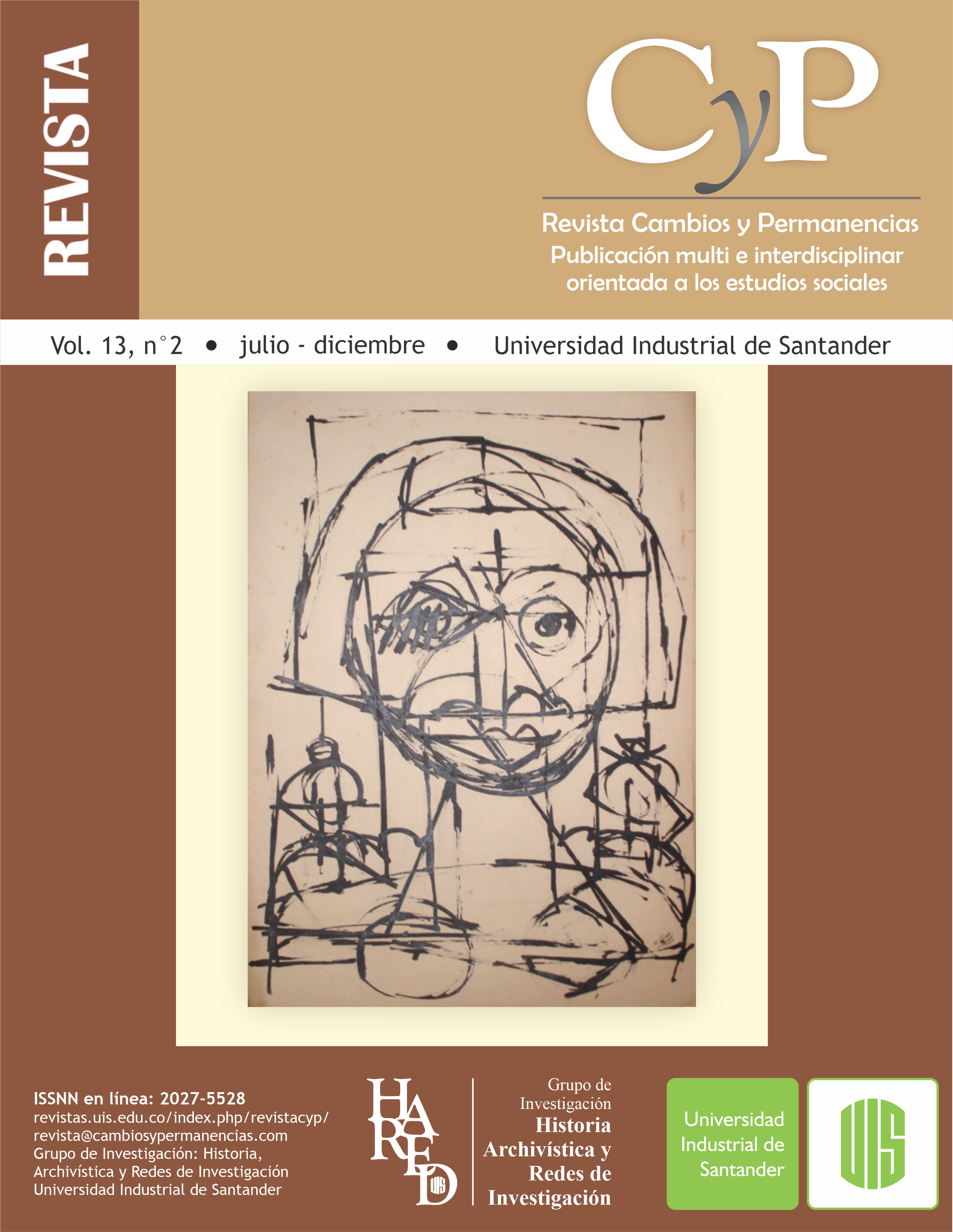LGBTIQA+ population in Costa Rica: advances in (national and institutional) rights and prospective for universities
Published 2022-11-27
Keywords
- Sexual-Gender Diversity,
- Affirmative Actions,
- Higher Education,
- Costa Rica,
- Public Polices
How to Cite
Copyright (c) 2022 Revista Cambios y Permanencias

This work is licensed under a Creative Commons Attribution 4.0 International License.
Abstract
The paper presents a general overview of the legal conditions of the LGBTIAQ+ population in Costa Rica. Civil marriage and trans identities are legally recognized but were achieved through an international ruling; thus, there is still no national legislation on the matter (section 2). Then, the situation of the University of Costa Rica (section 3), the country’s largest higher education institution, is addressed in terms of the advances in sexual and gender issues in the previous decade (2010-2020). Previously, as a preamble (section 1), the context of discrimination and lack of rights experienced by this historically excluded population is discussed. In addition, Recognition and Affirmation Initiatives (IRA in Spanish) arise as a response to the adverse realities faced by sexually diverse people (IRA is a concept proposed by the author, also presented in this article). The main emphasis of the paper (section 4) consists of recommendations for universities concerning actions with the purpose of fostering respectful, inclusive, and discrimination-free spaces. The last section contains a final reflection about the transformation of the university and social change.
Downloads
References
- Acuña Rodríguez, M. C. (2021a). Las Iniciativas de Reconocimiento y Afirmación de la población LGBTIQ+ en la Universidad de Costa Rica. Revista Estudios, 1-27. https://revistas.ucr.ac.cr/index.php/estudios/article/view/46040
- Acuña Rodríguez, M. C. (2021b). Reflexiones ético-metodológicas de la investigación sobre disidencia sexual y de género en un contexto universitario. Siwö' Revista de Teología/Revista de Estudios Sociorreligiosos, 14(1), 111-140. https://doi.org/10.15359/siwo.14-1.5
- Artavia, P. y Chinchilla, H. (2018). Guía sobre la Opinión Consultiva 24 (OC-24D/17) de la Corte Interamericana de Derechos Humanos sobre Matrimonio Igualitario y Derecho a la Identidad y nombre de las personas trans. Asociación Ciudadana ACCEDER / Frente por los Derechos Igualitarios. https://drive.google.com/file/d/1UeYvaKJ5hlw2bYGPc7qoGD44WiQ7RrSK/view?usp=drivesdk
- Butler, J. (2001). El género en disputa: el Feminismo y la subversión de la identidad. Paidós.
- Constitución Política de la República de Costa Rica [Const]. 8 de noviembre de 1949. http://www.pgrweb.go.cr/scij/Busqueda/Normativa/Normas/nrm_texto_completo.aspx?param1=NRTC&nValor1=1&nValor2=871&nValor3=0&strTipM=TC
- Corte Interamericana de Derechos Humanos (24 de noviembre de 2017). Opinión Consultiva OC-24D/17. http://corteidh.or.cr/docs/opiniones/seriea_24_esp.pdf
- Chinchilla, H., Valenciano, L. y Hernández, M. (2018). Guía: Situación de Derechos Humanos de las personas LGBTI en Costa Rica. Frente por los Derechos Igualitarios-Hivos. https://drive.google.com/file/d/1kawHlLDr_c5ZkQxx2EKz3W2rsjgNzhpN/view?usp=sharing
- Frente por los Derechos Igualitarios & Hivos. (2018). Línea del tiempo de eventos jurídicos mayores para la población LBGTI. https://drive.google.com/file/d/1NEy_MMRVYAV9LM9kN6BCrV22spJOQy81/view?usp=sharing
- García, U. Á. (2015). Teoría de los marcos de género. En A. Pié y J. Planella (Coords.), Políticas, prácticas y pedagogías traNs (pp. 41-61). Editorial UOC.
- Jiménez Bolaños, J. D. (2014). Temáticas en construcción: el desarrollo de los estudios BLGTI en Costa Rica, 1980-2013. Cuadernos Inter.c.a.mbio sobre Centroamérica y el Caribe, 11(2), 91-116.
- Ley No. 9343 de 2016. Reforma Procesal Laboral. 25 de enero de 2016. D. O. No. 16. http://www.pgrweb.go.cr/scij/Busqueda/Normativa/Normas/nrm_texto_completo.aspx?param1=NRTC&nValor1=1&nValor2=80985&nValor3=103105&strTipM=TC
- Planella, J. y Pié, A. (2015). Pedagogías transfronterizas: cuerpo, cultura y teoría queer. En A. Pié y J. Planella (Coords.), Políticas, prácticas y pedagogías traNs (pp. 15-40). Editorial UOC.
- Real Academia Española. (2022). Diccionario de la lengua española. RAE-ASALE. https://dle.rae.es/prospectivo#UQfWOEp
- Sarango, L. F. (28-30 de octubre de 2009). Saberes otros e interculturalidad [ponencia]. Encuentro Internacional de Interculturalidad, Universidad Pedagógica Nacional y Universidad Central, Bogotá, Colombia.
- Schilt, K., y Westbrook, L. (2009). Doing Gender, Doing Heteronormativity. Gender & Society, 23(4), 440–464. https://doi.org/10.1177/0891243209340034
- Sfeir, L. (2014). De actos e identidades: la homosexualidad en la construcción de la Modernidad. Revista Corpo-grafias, Indagaciones del sentir, 1(1), 78-91.
- Silva, N. (2009). Teoria da cultura de Darcy Ribeiro e a filosofia intercultural. Nova Harmonia.
- Tubino, F. (2007). Las ambivalencias de las acciones afirmativas. En J. Ansion y F. Tubino. (Eds.), Educar en ciudadanía intercultural: experiencias y retos en la formación de estudiantes universitarios indígenas (pp. 91-110). Fondo Editorial de la Pontificia Universidad Católica del Perú.
- Universidad de Costa Rica. (1974). Estatuto Orgánico de la Universidad de Costa Rica. La Gaceta Oficial No. 56. https://www.cu.ucr.ac.cr/normativ/estatuto_organico.pdf
- Universidad de Costa Rica. (2020a). Políticas Institucionales 2021-2025. La Gaceta Universitaria N°13. https://www.cu.ucr.ac.cr/uploads/tx_ucruniversitycouncildatabases/normative/politicas_institucionales_2021-2025.pdf
- Universidad de Costa Rica. (2020b). Reglamento de la Universidad de Costa Rica en contra de la discriminación. La Gaceta Universitaria N°15. https://www.cu.ucr.ac.cr/uploads/tx_ucruniversitycouncildatabases/normative/discriminacion.pdf
- Universidad de Costa Rica-Oficina de Planificación Universitaria. (2020c). La UCR en cifras. https://www.ucr.ac.cr/acerca-u/ucr-en-cifras.html
- Vicerrectoría de Acción Social, Universidad de Costa Rica. (2022). Búsqueda de proyectos. https://bite.ucr.ac.cr/bite/buscador_proyectos_publico
